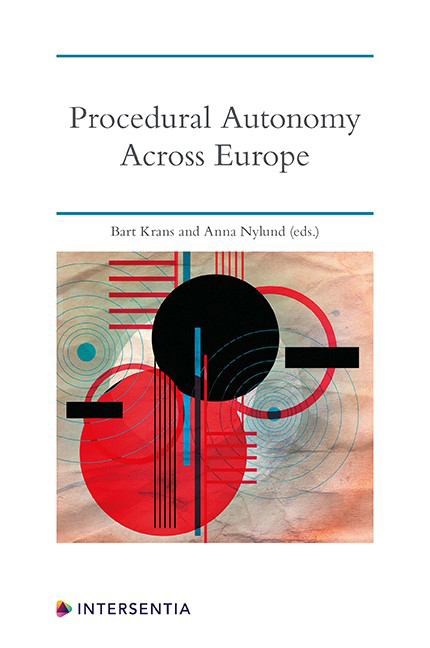Book contents
- Frontmatter
- Preface
- Contents
- Table of Cases
- List of Authors
- Aspects of Procedural Autonomy
- Procedural Autonomy and Belgian Civil Procedure Law: A Turbulent Cohabitation
- The English Approach to Procedural Autonomy
- The Finnish Way of Understanding Procedural Autonomy: A Practical Approach to Implementing EU Civil Procedural Law
- A German Perspective on the Waning Procedural Autonomy in Civil Matters: Who is Afraid of European Civil Procedure?
- Procedural Autonomy in the Netherlands: A Fading Relic?
- Procedural Autonomy, the EEA Agreement and Norwegian Law: The Art of Bridging a Gap and Maintaining it Too
- A Polish Perspective on Collective Civil Proceedings: Reluctance to Follow EU Recommendations?
- Procedural Autonomy between EU Law and the Slovenian Law of Civil Procedure
- Autonomy of the Spanish Legislator in the Regulation of Procedural Law: The Borders of European Case Law
- Procedural Autonomy in Sweden: Is Materielle Prozessleitung the Answer?
- Comparative Insights on Procedural Autonomy
- Index
- ABOUT THE EDITORS
Procedural Autonomy between EU Law and the Slovenian Law of Civil Procedure
Published online by Cambridge University Press: 30 April 2020
- Frontmatter
- Preface
- Contents
- Table of Cases
- List of Authors
- Aspects of Procedural Autonomy
- Procedural Autonomy and Belgian Civil Procedure Law: A Turbulent Cohabitation
- The English Approach to Procedural Autonomy
- The Finnish Way of Understanding Procedural Autonomy: A Practical Approach to Implementing EU Civil Procedural Law
- A German Perspective on the Waning Procedural Autonomy in Civil Matters: Who is Afraid of European Civil Procedure?
- Procedural Autonomy in the Netherlands: A Fading Relic?
- Procedural Autonomy, the EEA Agreement and Norwegian Law: The Art of Bridging a Gap and Maintaining it Too
- A Polish Perspective on Collective Civil Proceedings: Reluctance to Follow EU Recommendations?
- Procedural Autonomy between EU Law and the Slovenian Law of Civil Procedure
- Autonomy of the Spanish Legislator in the Regulation of Procedural Law: The Borders of European Case Law
- Procedural Autonomy in Sweden: Is Materielle Prozessleitung the Answer?
- Comparative Insights on Procedural Autonomy
- Index
- ABOUT THE EDITORS
Summary
INTRODUCTION
There have been significant developments since the European Court of Justice (hereinafter: ECJ) established the doctrine of procedural autonomy and the principles of effectiveness and equivalence restricting the scope of this doctrine. The doctrine had roots in time, when EU law was concerned The doctrine had roots in time, when EU law was concerned primarily with rights in substantive law and the doctrine of procedural autonomy was focused on the issue of how (substantive) rights, existing under EU law, are enforced in proceedings in national courts, pursuant to national procedural law. Nowadays however, the EU law itself – although often in a fragmented and in sectoral manner – extends deep into the domain of procedural law. Important EU instruments which affect civil procedure, perhaps even to a greater extent than the ‘judicial co-operation in civil matters’ can be found in those areas of EU law that are primarily concerned with substantive, not procedural law (e.g. alternative dispute resolution of consumer disputes, unfair contract terms in consumer contracts, collective redress, effective protection of IP rights, private enforcement of antitrust). In addition, starting with the adoption of so-called ‘second generation regulations’ even the core area of European civil procedure (i.e. judicial cooperation in civil matters) has slowly started to detach itself from traditional domains of international private law. Certain – though still fragmented – areas of ‘pure’ civil procedure are now subject to regulation on the community level. These developments do not per se diminish importance of procedural autonomy of Member States, in casu Slovenia, however the interface between EU law and national procedural law becomes more far reaching and more complex, thus opening doors for more uncertainty and tensions. Undoubtedly, the influence of EU law on Slovenian civil procedure is growing. This however does not mean that the issue of procedural autonomy has itself gained sufficient attention in Slovenian academic circles or in case law of Slovenian courts. In fact, the author could not find one single source, either in legal writing (either by authors specialising on the EU law or by authors specialising in civil procedure) or in case law even mentioning the issue of ‘procedural autonomy’. Though issues relating to the interface between national civil procedure law and EU civil procedure have been discussed, they have focused on different, usually more pragmatic aspects.
- Type
- Chapter
- Information
- Procedural Autonomy Across Europe , pp. 165 - 182Publisher: IntersentiaPrint publication year: 2020
- 2
- Cited by



